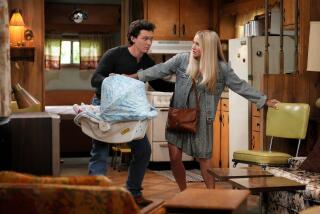Chuck Lorre talks about the good mojo and humbling work of sitcoms

- Share via
With four series in prime time this season — powerhouse comedies “The Big Bang Theory” and “Two and a Half Men,” as well as more recent arrivals “Mike & Molly” and “Mom,” a television academy honoree this year — Chuck Lorre has conquered the sitcom in a way that few TV producers have. He jokes that his office on the Warner Bros. lot has good mojo, having been inhabited by John Wells of “E.R.” and Sam Simon of “The Simpsons” at various points. Shortly before the season finale of “Big Bang” shot before a studio audience, Lorre took time out to talk about the challenges of nurturing a new series, his joy in writing strong female leads and how working on a sitcom is a humbling job.
What does a given day in the TV season look like for you? How do you decide where to start?
Ninety episodes got produced last year. It’s kind of silly. There were a few times where it wasn’t much of a stretch to be at home in a ball weeping in the corner. “Mom,” being prenatal, needs the most care. Creating a series is so hard. So that’s been a big part of the time and energy. “The Big Bang Theory” is one of the greatest gifts of my life. I don’t want to miss a minute of it, so I try not to. I don’t think I missed any tapings this year [and attended] as many run-throughs and table reads as I could. And “Mike & Molly” experienced a bit of a re-engineering this past year, so that has been a big part of the year. And “Two and a Half Men,” thankfully, has been running itself for the last two years. So I mainly just peek in and say, “I hope the show’s in color this week.” The show is in its 11th season, and everybody’s having a blast. You get to do a lot of invention when you have a wholesale reorganization of the cast.
For a new show like “Mom,” how do you work with the writers? Are you there every day in the writers room?
Every day, yeah. It’s too vulnerable; it’s too fragile. This show’s been an attempt to do something different while still being a comedy. At the risk of sounding terribly overblown, [“Mom”] is about hope and redemption, about someone repairing their life and tackling subject matters that are normally verboten in comedy. Writing stories like that requires a tremendous amount of patience because it’s not readily apparent what’s funny when someone is struggling with alcoholism or cancer or estrangement from a parent.
You wrote for “Roseanne” and created “Grace Under Fire” and “Cybill,” and now you have Allison Janney and Anna Faris on “Mom.” What appeals to you in writing those strong female leads?
I just believe that a single mom working to have a life and take care of her children is one of the more heroic things you can do in this culture. It’s crazy, crazy difficult. And so honoring that journey, that struggle, and finding some comedy in it, it’s a story worth telling. Writing for women has always been a great way to explore a character and relationships because women tend to be more articulate and empathetic. When you see two men [on TV] sit at a bar and talk about what’s on their mind and in their heart, you know the writer is lying. Because men can know each other for a lifetime and never discuss anything of consequence.
Beyond the satisfaction of making people laugh, what keeps you coming back?
That’s it. Every week you are humbled by how wrong you can be, because the four-camera genre has rehearsals. And you get to see your words played out by really good actors, and you watch the actors fail because the words fail. And then you have to rewrite. You get to show night and the audience can sit there deadly quiet when you think you’ve done something hilarious. You can hear the 134 Freeway going by in the background, it’s so quiet. And you realize again that you’re wrong, and it’s humbling and upsetting. And you have to fix it.
Sign up for the Envelope Newsletter
More to Read
From the Oscars to the Emmys.
Get the Envelope newsletter for exclusive awards season coverage, behind-the-scenes stories from the Envelope podcast and columnist Glenn Whipp’s must-read analysis.
You may occasionally receive promotional content from the Los Angeles Times.






